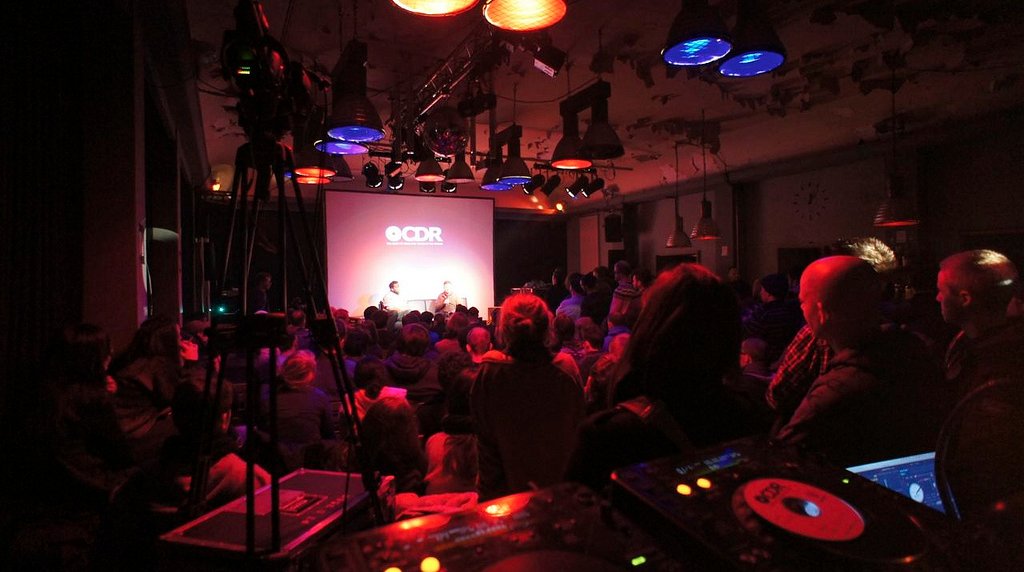CDR events offer musicians a chance to play tracks - finished and in-progress - on a professional soundsystem, and in a constructively critical environment, CDR sessions have taken place in multiple international locations for over a decade.
The genesis of CDR goes back a decade to the creative process of founder Tony Nwachukwu. A producer and DJ, Tony sought to expose the process behind the tracks he was producing and DJing, while also fostering a community of like-minded producers for learning and exchanging ideas. CDR events started in London as an opportunity for musicians to hear finished and in-progress tracks mixed on a professional system, in a constructively critical environment. Having since expanded to include new locations and even a radio show, Tony has used CDR sessions as an opportunity for public discussions with artists - such discussions often feature unparalleled depth in discussing process and setup for the artist featured.
In advance of the CDR discussion with Ewan Pearson next Monday during the 20 Jahre Kompakt pop-up store at Ableton HQ, we sat down with Tony to get some background on CDR, his musical influences, and what keeps him learning and exploring a decade in.
*****
Why did you first start CDR in London? How and when did it happen?
CDR first started in London as it is where I am from and a city whose (then) music landscape inspired the concept. The idea came about whilst DJing at a warehouse party in Old Street in 2002. Some of the tracks I played were in varying states of completion, but it dawned on me that I was the only one who knew each track’s level of completion. I thought it would be interesting to explore an event where everyone could listen to each other’s tracks, regardless of their level of completion. I wanted to challenge the notion of 'what is finished?' This has spawned into a framework that includes Archive (a DJ set of tracks submitted at previous sessions); Open CDR submissions on or before a specific session; and Works and Inspirations (DJ sets or performances by producers and labels). The first event happened at the Embassy, a basement in a North London pub; but the room was full of 'heads'. I knew I was onto something. After a brief stint at the Bridge n Tunnel, CDR found its long-term home at Plastic People, where it continues its monthly residency. In recent years, creating learning opportunities became a focus and led to CDR Knowledge, iOS Music Meet and Beats Sunday Dinner.
How did you end up expanding CDR to other cities? Do you find that anything differentiates the events between one city and another?
Since its inception and with roots firmly in London, CDR has travelled throughout the UK, and then across the pond to Barcelona, India, Tel Aviv and Paris - most of which were bespoke projects. I suppose these were works in progress, leading to more long-term relationships with sustainable homes, labels and producers, enabling us to explore ways to connect communities of producers. CDR now resides in Berlin and Copenhagen on a bi-monthly rotation, with more in the pipeline. I tend to work in collaboration with my local teams and, whilst keeping to the original framework, am happy to play with the format. For example, CDR Berlin is a cross between CDR sessions and CDR Knowledge (featuring panels and discussions) and is produced with my friends Dirk Rumpff and Benny Savary who bring a wealth of talent and expertise to these events.
CDR seems to provide a platform for experimentation. Copenhagen is the most recent residency, so I know this one is heading in the direction of Berlin's sessions - people are hungry for the break-down and dissemination of knowledge that this format brings. People love hearing not just what they are working on or what their friends are working on, but what the global CDR community is working on. The curation process is more and more paramount. The journey that the audience explores has to be masterfully created.
An interesting development has been embedding CDR into festivals, namely Copenhagen's Strøm and Dimensions Festival Croatia. These give us the opportunity to embed the format whilst introducing projects around it.
